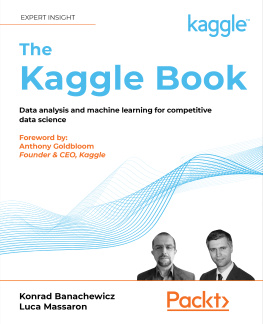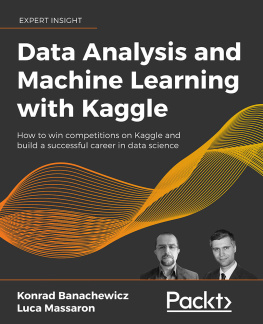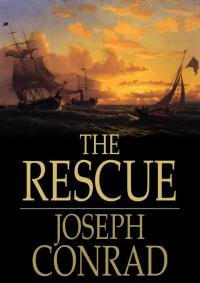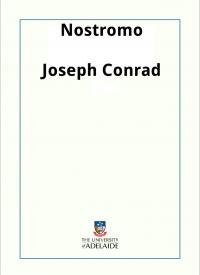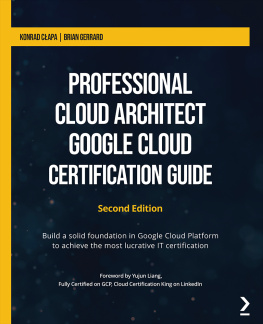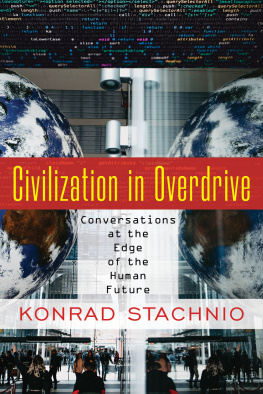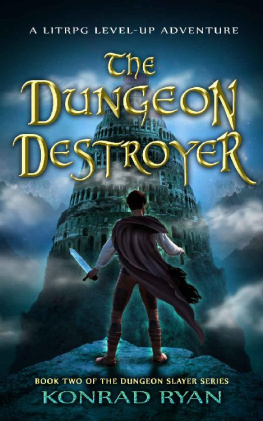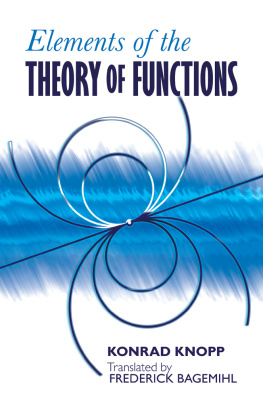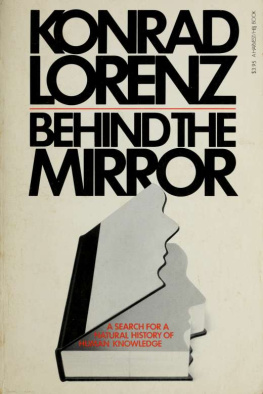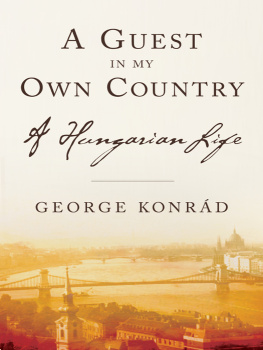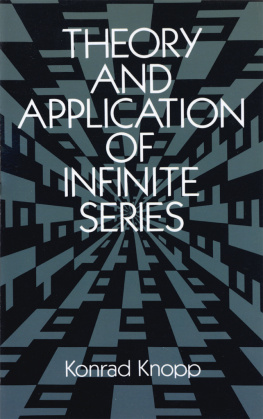Konrad Banachewicz - The Kaggle Book
Here you can read online Konrad Banachewicz - The Kaggle Book full text of the book (entire story) in english for free. Download pdf and epub, get meaning, cover and reviews about this ebook. year: 2022, publisher: Packt, genre: Home and family. Description of the work, (preface) as well as reviews are available. Best literature library LitArk.com created for fans of good reading and offers a wide selection of genres:
Romance novel
Science fiction
Adventure
Detective
Science
History
Home and family
Prose
Art
Politics
Computer
Non-fiction
Religion
Business
Children
Humor
Choose a favorite category and find really read worthwhile books. Enjoy immersion in the world of imagination, feel the emotions of the characters or learn something new for yourself, make an fascinating discovery.
- Book:The Kaggle Book
- Author:
- Publisher:Packt
- Genre:
- Year:2022
- Rating:3 / 5
- Favourites:Add to favourites
- Your mark:
- 60
- 1
- 2
- 3
- 4
- 5
The Kaggle Book: summary, description and annotation
We offer to read an annotation, description, summary or preface (depends on what the author of the book "The Kaggle Book" wrote himself). If you haven't found the necessary information about the book — write in the comments, we will try to find it.
The Kaggle Book — read online for free the complete book (whole text) full work
Below is the text of the book, divided by pages. System saving the place of the last page read, allows you to conveniently read the book "The Kaggle Book" online for free, without having to search again every time where you left off. Put a bookmark, and you can go to the page where you finished reading at any time.
Font size:
Interval:
Bookmark:

The Kaggle Book
Data analysis and machine learning for competitive data science
Konrad Banachewicz
Luca Massaron

BIRMINGHAMMUMBAI
Packt and this book are not officially connected with Kaggle. This book is an effort from the Kaggle community of experts to help more developers.
The Kaggle Book
Copyright 2022 Packt Publishing
All rights reserved. No part of this book may be reproduced, stored in a retrieval system, or transmitted in any form or by any means, without the prior written permission of the publisher, except in the case of brief quotations embedded in critical articles or reviews.
Every effort has been made in the preparation of this book to ensure the accuracy of the information presented. However, the information contained in this book is sold without warranty, either express or implied. Neither the authors, nor Packt Publishing or its dealers and distributors, will be held liable for any damages caused or alleged to have been caused directly or indirectly by this book.
Packt Publishing has endeavored to provide trademark information about all of the companies and products mentioned in this book by the appropriate use of capitals. However, Packt Publishing cannot guarantee the accuracy of this information.
Producer: Tushar Gupta
Acquisition Editor Peer Reviews: Saby Dsilva
Project Editor: Parvathy Nair
Content Development Editor: Lucy Wan
Copy Editor: Safis Editing
Technical Editor: Karan Sonawane
Proofreader: Safis Editing
Indexer: Sejal Dsilva
Presentation Designer: Pranit Padwal
First published: April 2022
Production reference: 2220422
Published by Packt Publishing Ltd.
Livery Place
35 Livery Street
Birmingham
B3 2PB, UK.
ISBN 978-1-80181-747-9
www.packt.com
I had a background in econometrics but became interested in machine learning techniques, initially as an alternative approach to solving forecasting problems. As I started discovering my interest, I found the field intimidating to enter: I didnt know the techniques, the terminology, and didnt have the credentials that would allow me to break in.
It was always my dream that Kaggle would allow people like me the opportunity to break into this powerful new field. Perhaps the thing Im proudest of is the extent to which Kaggle has made data science and machine learning more accessible. Weve had many Kagglers go from newbies to top machine learners, being hired at places like NVIDIA, Google, and OpenAI, and starting companies like DataRobot.
Luca and Konrads book helps make Kaggle even more accessible. It offers a guide to both how Kaggle works, as well as many of the key learnings that they have taken out of their time on the site. Collectively, theyve been members of Kaggle for over 20 years, entered 330 competitions, made over 2,000 posts to Kaggle forums, and shared over 100 notebooks and 50 datasets. They are both top-ranked users and well-respected members of the Kaggle community.
Those who complete this book should expect to be able to engage confidently on Kaggle and engaging confidently on Kaggle has many rewards.
Firstly, its a powerful way to stay on top of the most pragmatic developments in machine learning. Machine learning is moving very quickly. In 2019, over 300 peer reviewed machine learning papers were published per day. This volume of publishing makes it impossible to be on top of the literature. Kaggle ends up being a very valuable way to filter what developments matter on real-world problems and Kaggle is useful for more than keeping up with the academic literature. Many of the tools that have become standard in the industry have spread via Kaggle. For example, XGBoost in 2014 and Keras in 2015 both spread through the community before making their way into industry.
Secondly, Kaggle offers users a way to learn by doing. Ive heard active Kagglers talk about competing regularly as weight training for machine learning. The variety of use cases and problems they tackle on Kaggle makes them well prepared when they encounter similar problems in industry. And because of competition deadlines, Kaggle trains the muscle of iterating quickly. Theres probably no better way to learn than to attempt a problem and then see how top performers tackled the same problem (its typical for winners to share their approaches after the competition).
So, for those of you who are reading this book and are new to Kaggle, I hope it helps make Kaggle less intimidating. And for those who have been on Kaggle for a while and are looking to level up, I hope this book from two of Kaggles strongest and most respected members helps you get more out of your time on the site.
Anthony Goldbloom
Kaggle Founder and CEO
Konrad Banachewicz holds a PhD in statistics from Vrije Universiteit Amsterdam. During his period in academia, he focused on problems of extreme dependency modeling in credit risk. In addition to his research activities, Konrad was a tutor and supervised masters students. Starting from classical statistics, he slowly moved toward data mining and machine learning (this was before the terms data science or big data became ubiquitous).
In the decade after his PhD, Konrad worked in a variety of financial institutions on a wide array of quantitative data analysis problems. In the process, he became an expert on the entire lifetime of a data product cycle. He has visited different ends of the frequency spectrum in finance (from high-frequency trading to credit risk, and everything in between), predicted potato prices, and analyzed anomalies in the performance of large-scale industrial equipment.
As a person who himself stood on the shoulders of giants, Konrad believes in sharing knowledge with others. In his spare time, he competes on Kaggle (the home of data science).
I would like to thank my brother for being a fixed point in a chaotic world and continuing to provide inspiration and motivation. Dziki, Braciszku.
Luca Massaron is a data scientist with more than a decade of experience in transforming data into smarter artifacts, solving real-world problems, and generating value for businesses and stakeholders. He is the author of bestselling books on AI, machine learning, and algorithms. Luca is also a Kaggle Grandmaster who reached no. 7 in the worldwide user rankings for his performance in data science competitions, and a Google Developer Expert (GDE) in machine learning.
My warmest thanks go to my family, Yukiko and Amelia, for their support and loving patience as I prepared this new book in a long series.
My deepest thanks to Anthony Goldbloom for kindly writing the foreword for this book and to all the Kaggle Masters and Grandmasters who have so enthusiastically contributed to its making with their interviews, suggestions, and help.
Finally, I would like to thank Tushar Gupta, Parvathy Nair, Lucy Wan, Karan Sonawane, and all of the Packt Publishing editorial and production staff for their support on this writing effort.
Dr. Andrey Kostenko is a data science and machine learning professional with extensive experience across a variety of disciplines and industries, including hands-on coding in R and Python to build, train, and serve time series models for forecasting and other applications. He believes that lifelong learning and open-source software are both critical for innovation in advanced analytics and artificial intelligence.
Font size:
Interval:
Bookmark:
Similar books «The Kaggle Book»
Look at similar books to The Kaggle Book. We have selected literature similar in name and meaning in the hope of providing readers with more options to find new, interesting, not yet read works.
Discussion, reviews of the book The Kaggle Book and just readers' own opinions. Leave your comments, write what you think about the work, its meaning or the main characters. Specify what exactly you liked and what you didn't like, and why you think so.

